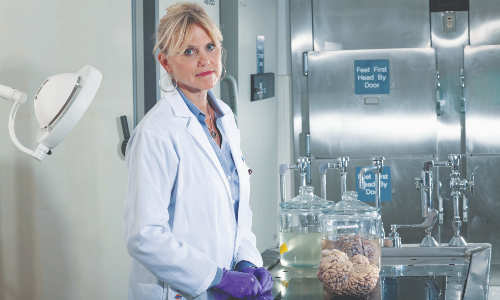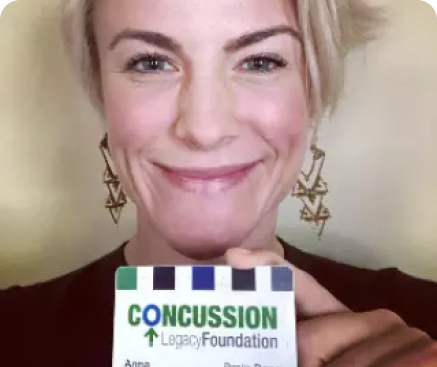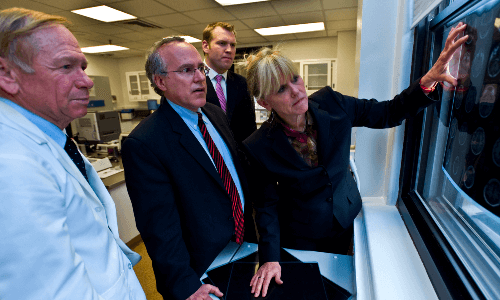
UNITE Brain Bank report marks 1,000 brain donation milestone
1,000 Reasons for Hope is a report celebrating what researchers have learned from the first 1,000 Legacy Donors. The report honors our Legacy Donors and their families, features never-before-seen donor demographics, and spotlights new testimonials from donor family members, including Dwayne Johnson.
The report also shows how those first 1,000 Legacy Donors are mapping the future of brain trauma research. It features insights from Dr. Ann McKee, Chris Nowinski, Ph.D., and 17 of the world’s top CTE researchers about what they expect to learn from the next thousand donors.
About the UNITE Brain Bank
The only way to accurately diagnose many brain diseases, including Chronic Traumatic Encephalopathy (CTE), is studying the brain after death. In 2008 the Concussion Legacy Foundation partnered with Boston University and the U.S. Department of Veterans Affairs to found the VA-BU-CLF Brain Bank. Led by Dr. Ann McKee, the researchers and staff of the VA-BU-CLF Brain Bank have revolutionized our understanding of CTE and brain trauma.
When it opened in 2008, the VA-BU-CLF Brain Bank became the first repository in the world dedicated to the study of CTE. Today, the Brain Bank focuses on concussions and other consequences of brain trauma, and has discovered the first cases of CTE in athletes whose primary exposure was soccer, rugby, baseball, ice hockey, college football and high school football. The VA-BU-CLF Brain Bank became the UNITE Brain Bank in 2022 and remains the single greatest CTE research resource in the world, housing 70% of global CTE cases.


It all begins with the incredible gift of a donated brain (click here to learn how to join the brain donation registry). More than 1,000 generous individuals and families have donated tissue to the UNITE Brain Bank, creating the world’s largest CTE repository. The generosity of our Legacy Families has laid the foundation for incredible discoveries about the long term consequences of brain trauma.
Our Legacy Donors are the heroes of the battle against CTE. Thanks to these families and donors, we have compiled a diverse collection of donated tissue proving CTE is not only a problem for football, but a problem for any sport with routine head impacts as well as military veterans.
Upon arrival, the donated tissue is carefully studied and analyzed for evidence of all known brain diseases, including CTE. Researchers also conduct extensive interviews with friends and family of the Legacy Donor to understand what they were like in life, providing context for the tissue analysis. The tissue is then stored and samples are made available to leading researchers around the world.
Dr. Ann McKee is changing the world with her research. In 2018, Dr. McKee was named one of TIME Magazine’s 100 Most Influential People in the World, received a Lifetime Achievement Award from the Alzheimer’s Association, and was also elected by her peers to the National Academy of Medicine. In 2017, she was named Bostonian of the Year by the Boston Globe.
Read more about Dr. McKee here. Support her research by clicking here.
About the CLF Global Brain Bank
The mission of the Concussion Legacy Foundation Global Brain Bank is to accelerate research by collaborating with leading scientists at brain banks around the globe to understand, prevent, treat, and eventually cure CTE and other consequences of sports-related brain trauma.




CTE is a global problem, but due to a lack of brain tissue, few researchers outside the United States can study CTE, creating a lack of awareness that CTE exists outside the U.S. CTE has been diagnosed in athletes with a history of playing global sports such a football (soccer), rugby, and ice hockey, and in countries including the United Kingdom, Australia, and Brazil.
The sheer number of CTE cases diagnosed in the U.S. in the last decade has surprised researchers and raised the concern that CTE is far more prevalent in contact sports than once thought. We urgently need answers, and the Concussion Legacy Foundation Global Brain Bank will activate scientists from every corner of the globe in the fight against CTE.
Prior to 2008, there were no academic research centers focused on CTE. That year, CLF partnered with leading experts in neurodegenerative disease pathology at the US Department of Veterans Affairs (VA), and Boston University (BU) in 2008 to create the VA-BU-CLF Brain Bank, now the most successful athlete brain donation program in the world. While the scientists independently lead the research, CLF leads outreach, recruiting, and education efforts.
Prior to 2008, only 45 cases of CTE had been diagnosed worldwide since 1928. Since then, more than 1,000 brains have been donated to the UNITE Brain Bank, about two thirds of which have been diagnosed with CTE.
CLF Global Brain Bank collaborators include the Australian Sports Brain Bank, a partnership between Royal Prince Alfred Hospital and the University of Sydney’s Brain and Mind Centre; the Biobank for Aging Studies at the University of São Paulo in Brazil; the Neurological Foundation Human Brain Bank at the University of Auckland’s Centre for Brain Research; and the Concussion Legacy Project in the UK, a partnership between the Concussion Legacy Foundation UK and the Jeff Astle Foundation led by Dr. Gabriele DeLuca, Professor of Clinical Neurology and Experimental Neuropathology at the University of Oxford.
Some of the world’s greatest researchers on brain trauma and CTE are collaborating to advance toward a cure for this disease that affects athletes and military veterans all over the world. View the leadership team.
Brain bank research is providing undeniable evidence
The findings of the UNITE Brain Bank and the CLF Global Brain Bank are published in peer-reviewed medical journals, and have created an undeniable body of evidence that repetitive brain trauma can lead to the devastating neurodegenerative disease CTE.
The legacies of more than 600 confirmed cases of CTE highlight the need for a better approach to managing and responding to brain trauma. The evidence has silenced those denying a link between brain trauma and CTE, winning endorsements from high ranking members of the National Institute of Health and the Department of Defense.
“I don’t think there’s any wiggle room. It’s pretty clear this is due to head injury. Whether there are other things involved, and when it starts, that’s hard to know, but I don’t think there’s any question that it’s related to head injury.”
– Dr. Walter Koroshetz, National Institute of Health
“CTE is only seen in the setting of repeated head trauma. At the end of the day, this is produced by head trauma. I’m sorry, that’s what all the research says.”
– Dr. Dan Perl, Department of Defense via ESPN
The Concussion Legacy Foundation’s role
The Concussion Legacy Foundation continues to support the UNITE Brain Bank through leading outreach, recruiting, and educational efforts. CLF co-founders Dr. Robert Cantu and Chris Nowinski, Ph.D. serve on the BU ADC executive committee. In addition, the Foundation has donated more than $2 million to BU School of Medicine to support CTE research, including supporting the UNITE Brain Bank and Young Investigator Fellowship, SHINE Study, LEGEND Study, and more.
CLF also leads international outreach, recruiting, and education efforts for all members of the CLF Global Brain Bank.
Lisa McHale, CLF’s Director of Legacy Family Relations, exclusively supports Legacy Donor families through the donation process and beyond.

